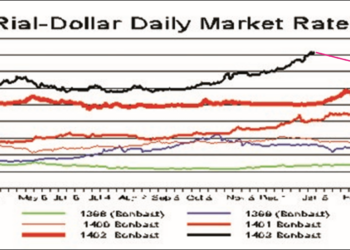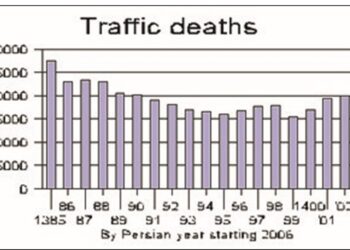or about 15 percent of its gasoline needs, the International Oil Daily reported Monday.
That is much less than Iran used to import, but still leaves the country dependent on gasoline imports to avoid long lines at service stations.
For years, Iran imported about one-third of its needs or an average of 22 million liters a day out of 66 million liters consumed.
Since prices were jacked up last December, consumption has fallen, albeit nowhere near as much as Iranian officials expected. Over the last eight weeks, consumption has averaged 58 million liters a day, according to published official statistics.
Imports of 8.5 million liters a day would amount to 15 percent of that consumption.
The Islamic Republic has repeatedly said that it no longer imports any gasoline at all and, in fact, is now exporting gasoline. It has said that gasoline imports ended last September.
The government has a major refinery expansion program underway to produce more gasoline. It is far behind schedule, however. But the government says it converted some petrochemical plants to produce gasoline until the new refineries come on stream.
An unnamed official told the Bloomberg news agency that the petrochemical plants stopped making gasoline as of January 21 because local refinery output was by then sufficient.
On Monday, Ali-Reza Zeighami, managing director of the National Iranian Oil Refining and Distribution Co. (NIORDC), told Shana, the Oil Ministry’s news service, that Iran’s refineries are now producing 57 million to 59 million liters per day, which would be right in line with the announced consumption rate of 58 million liters.
But the International Oil Daily story suggests that either the production or consumption numbers—or both—are being tinkered with. If what Zeighami says is true, there would be no need for gasoline imports at all. The issue of gasoline imports is very sensitive politically, so the government has every encouragement to deny imports, whether that is true or not.
The vocal opposition to President Ahmadi-nejad has not, however, accused the president of lying on this point. That is not unusual, however, as denunciations of the president are normally confined to domestic issues with foreign matters viewed as too sensitive.
However, in a technical report, a Majlis committee complained Sunday that the government had imported more gasoline in the last Persian year than the Majlis had authorized. That report referred to the entire calendar year from March 2010 through March 2011. It avoided saying whether imports continued after the government said they had been ended in September. But it would appear to be difficult for the government to import more gasoline than authorized if it only imported gasoline for half of the year.
The government has issued numerous and conflicting accounts of when its refinery expansion program would be completed and self-sufficiency in gasoline achieved. For example, in 2009, Deputy Oil Minister Nureddin Shahnazizadeh said self-sufficiency in gasoline would be reach in 2012. In 2010, he said self-sufficiency would “hopefully” arrive by Now Ruz 2013.
But Energy Market Consultants, an American based analytical firm, calculated last year that self-sufficiency would be reached only in 2015 and only then if all construction plans were fulfilled on schedule.
Money is a key. A year ago, the daily Hamshahri quoted the manager of the Khuzestan refinery project as saying he was short of capital to carry out that project, one of eight major refinery projects underway.
Hamshahri said the funding plan called for the government to put up only 20 percent of the funds for refinery expansion with the remaining 80 percent to come from investors, both domestic and foreign.
In a related story, the Kuwaiti daily Al-Jarada reported last Thursday that the Kuwaiti police had busted a ring smuggling fuel to an unnamed neighboring country from the small port of Doha. That port is used almost exclusively by small boats handling trade to and from Iran. The newspaper said the smuggling ring was linked “to a regional intelligence service.” It said the amounts smuggled out were so large that the smuggling depleted Kuwait’s reserve of refined products and forced the government to import fuel recently. But it did not give any numbers for the smuggled volume.
The International Oil Daily cited shipping sources in the Persian Gulf as saying Iran’s gasoline imports were coming mostly from the Asian-Pacific region, without naming any countries or companies. All the major international traders dealing in gasoline have announced they have halted dealings with Iran so as not to cross the United States, with which they do much business.
Last summer, the US Congress passed a new sanctions law that threatened sanctions on firms that sold gasoline or other refined products to Iran. The theory of the sponsors of that legislation was that Iran could be brought to its needs if it could not import gasoline.













